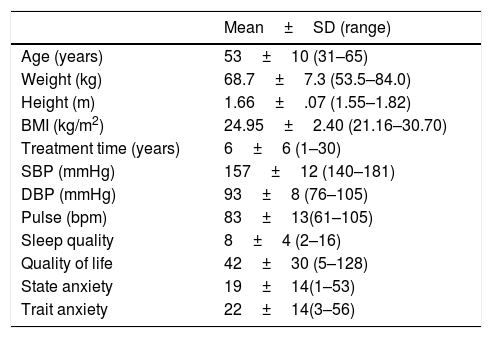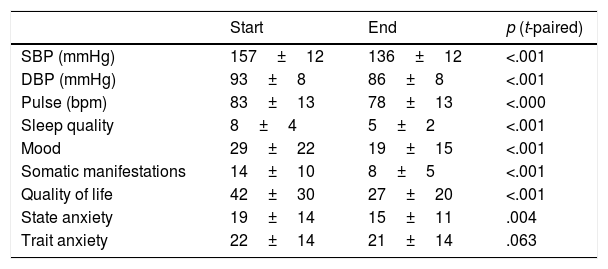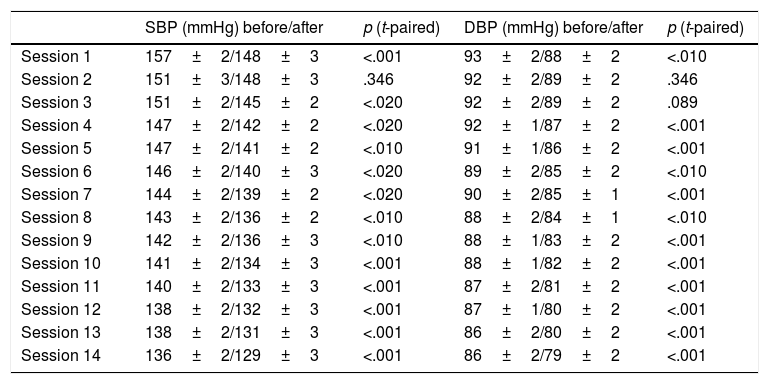To evaluate whether the application of a relaxation therapy reduces the blood pressure in hypertensive patients and whether there is improvement in several parameters which can influence blood pressure such as anxiety, quality of life and sleep.
MethodsA quasi-experimental study (measures before-after) was performed in 25 Primary Care patients with hypertension poorly controlled by pharmacological treatment. The intervention consisted of relaxation therapy composed of 3 techniques: passive relaxation of Schwartz–Haynes, diaphragmatic breathing and imaginary visualisation. A total of 14 group sessions of 30min each (2/week) were conducted. Systolic and diastolic blood pressure were taken at the beginning and end of the relaxation programme implemented and after each of the programme sessions. The Pittsburgh Sleep Quality, Quality of Life Hypertension, State-Trait Anxiety and Perceived Stress questionnaires were used to measure psychosocial parameters.
ResultsAfter intervention, a reduction in systolic blood pressure of 20mmHg (p<.001) and of 8mmHg (p<.001) in diastolic blood pressure was observed. Regarding other factors, sleep quality (p<.001), quality of life (p<.001) and state anxiety (p=.004) were significantly improved.
ConclusionsRelaxation therapy had positive effects in improving blood pressure parameters, as well as the other factors evaluated. In our opinion, such strategies should be evaluated more thoroughly to consider their inclusion in Primary Care.
Evaluar si la aplicación de una terapia de relajación reduce las cifras tensionales en pacientes hipertensos y si existe mejora en varios parámetros que pueden ejercer influencia sobre la presión arterial tales como ansiedad, calidad de vida y sueño.
MétodosEstudio cuasiexperimental (medidas antes-después). Participaron 25 pacientes de Atención Primaria con hipertensión arterial mal controlada con fármacos. La intervención consistió en terapia de relajación constituida por 3 técnicas: relajación pasiva de Schwartz-Haynes, respiración diafragmática y visualización imaginaria. Se realizaron un total de 14 sesiones grupales (2/semana) de 30min. Se analizaron los valores de presión arterial sistólica y diastólica al inicio y final del programa de relajación implantado y después de cada una de las sesiones del programa. Para la medición de los parámetros se emplearon los siguientes cuestionarios: Calidad del Sueño de Pittsburgh, Calidad de Vida en Hipertensión Arterial, Ansiedad Estado-Rasgo.
ResultadosTras la intervención, observamos una reducción de la presión arterial sistólica de 20mmHg (p<0,001) y de la diastólica de 8mmHg (p<0,001). En cuanto a los otros parámetros analizados, la calidad del sueño mejoró significativamente (p<0,001), así como la calidad de vida (p<0,001) y la ansiedad estado (p=0,004).
ConclusionesLa terapia de relajación tuvo efectos positivos en los parámetros de presión arterial, así como en los demás factores evaluados. En nuestra opinión, estrategias de este tipo deben ser estudiadas de forma más exhaustiva para considerar su inclusión en Atención Primaria.










